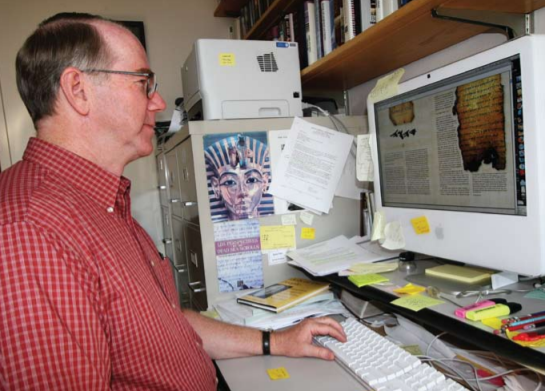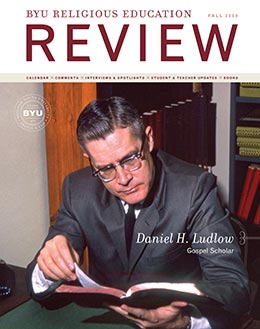Daniel O. McClellan (danielo.mcclellan@gmail.com) was a master's student in Jewish studies at Oxford University.
BYU’s Ancient Near Eastern Studies (ANES) major began in 2005, developing, along with the Middle Eastern Studies/
Dr. Dana M. Pike, the coordinator of the ANES program since its inception, helped design the major so it would provide a solid foundation for students going on to graduate school in ancient Near Eastern and biblical studies. BYU professors who teach classes for the ANES major come from the law school and departments such as ancient scripture, history, Hebrew, classics, anthropology, and Church history and doctrine. This breadth has helped prepare students to perform well across a wide range of disciplines. Students from the major’s three graduating classes up to this point have been accepted in graduate programs at Oxford, Duke, the University of Edinburgh, Trinity Western University, Andrews University, Claremont Graduate University, Washington University, the Catholic University of America, and elsewhere.
In addition to overseeing administrative aspects of the major, Dr. Pike is also the faculty adviser for the Students of the Ancient Near East (SANE), a student organization geared toward providing academic resources for ANES majors. SANE contributes funding and helps promote BYU’s student journal for the study of the ancient world, Studia Antiqua, which provides opportunities for ANES and other students to publish research related to biblical studies and other aspects of the ancient world. SANE also sponsors, in collaboration with the ANES program, an annual symposium on a Bible-related theme. Last year’s symposium, on temples and ritual in antiquity, included several BYU professors and students and drew an audience in the hundreds. Also, several ANES students have had the opportunity to present their own research in academic conferences in Denver, Boston, Rome, British Columbia, and New Orleans on topics ranging from textual criticism of the Septuagint version of Exodus to early Christian perspectives on the Shepherd of Hermas.
Thanks to his rapport with Bible scholars all over the world, Dr. Pike is also able to serve the major by inviting visiting professors to make presentations at BYU. In the last four years, ANES has hosted scholars such as Gary Rendsburg of Rutgers University, Melvin K. H. Peters of Duke University, Rob Hiebert and Peter Flint of Trinity Western University, and K. Lawson Younger Jr. of Trinity International University. With assistance from BYU’s David M. Kennedy Center for International Studies, ANES has also hosted international scholars like Michel Maqdissi from Syria’s Department of Antiquities, Aren Maeir from Bar Ilan University in Israel, and David Taylor from Oxford University.
 Dr. Dana M. Pike is coordinator of BYU’s Ancient Near Eastern Studies (ANES) and the faculty adviser for students of the Ancient Near East (SANE)
Dr. Dana M. Pike is coordinator of BYU’s Ancient Near Eastern Studies (ANES) and the faculty adviser for students of the Ancient Near East (SANE)
Dr. Pike’s current research interests focus on claims of divine election and premortal existence found in the Hebrew Bible and other ancient Near Eastern texts. Last November, at the annual meeting of the Society of Biblical Literature (SBL), the largest gathering of biblical scholars in the world, Dr. Pike presented a paper that questioned academic claims of a merely figurative preexistence in Jeremiah 1:5. In a similar vein, Dr. Pike’s 2007 SBL presentation analyzed the phrase “God of the spirits of all flesh” in Numbers 16:22 and 27:16. Other recent presentations have dealt with Babylonian king Hammurabi’s claims of divine election. Two of these articles are being submitted later this year to prestigious academic journals for publication. A summary of Dr. Pike’s work on divine election, “Before Jeremiah Was: Divine Election in the Ancient Near East,” was recently published for a Latter-day Saint audience in the Religious Studies Center’s A Witness for the Restoration: Essays in Honor of Robert J. Matthews (2007).
Dr. Pike has also been hard at work on a new book, coauthored with Dr. Richard Neitzel Holzapfel and Dr. David R. Seely, to be published this fall by Deseret Book. Entitled Jehovah and the World of the Old Testament, it is a companion publication to Deseret Book’s Jesus Christ and the World of the New Testament (2006). Dr. Pike says, “There is a great deal of cultural and historical information in the Old Testament. Understanding the historical background of the ancient Israelites and their cultural and literary conventions provides a richer and more rewarding experience when reading the Old Testament. We really hope this book will help many Latter-day Saints better appreciate and understand the world of the Old Testament so they can better understand the Old Testament itself.”
Scholars like Dana M. Pike serve the Brigham Young University community by representing BYU in their professional interactions with members of the academic community, by producing scholarship that has significance for Latter-day Saints, and by overseeing BYU’s efforts to train future scholars in an atmosphere of faith, service, and academic integrity.
